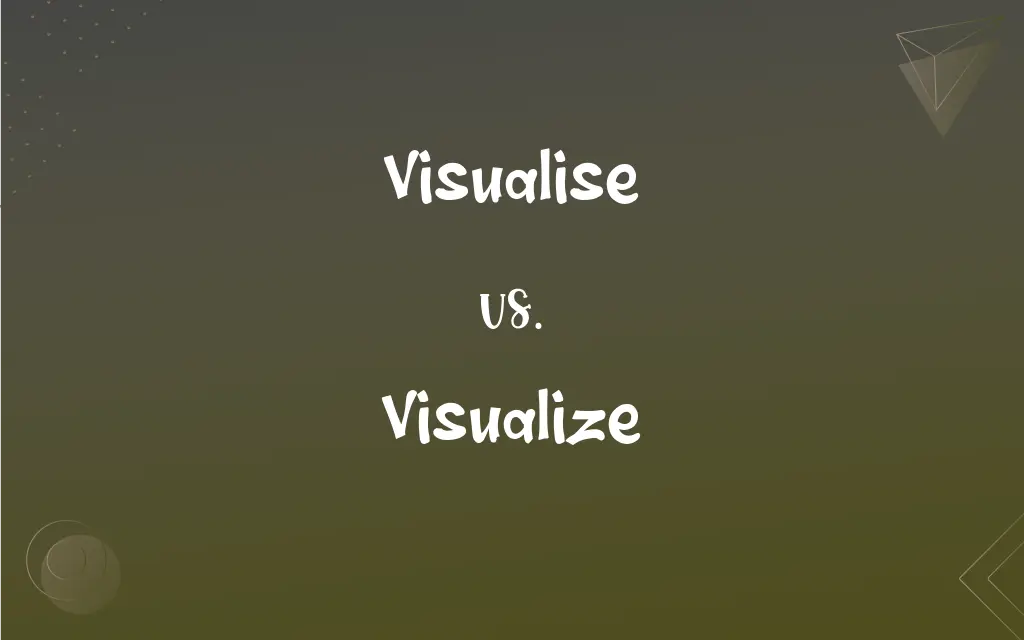Visualise vs. Visualize: What's the Difference?
Edited by Harlon Moss || By Janet White || Updated on October 4, 2023
"Visualise" and "Visualize" both mean to form a mental image, with "Visualise" being the British spelling and "Visualize" the American.

Key Differences
"Visualise" and "Visualize" are semantically identical; they both refer to the act of creating a mental picture or imagining something. The distinction between the two is not in their meanings but in their regional usage. "Visualise" is the preferred spelling in British English, adopting the '-ise' suffix, which is common in British variations of many words. Conversely, "Visualize" is spelled with the '-ize' suffix, which is typical in American English.
While both "Visualise" and "Visualize" are understood internationally and are interchangeable in terms of their definition, they reflect regional language preferences. For instance, if you're writing for a predominantly British audience or following UK writing standards, "Visualise" would be the appropriate choice. Conversely, for American readers or in line with US writing conventions, "Visualize" is expected.
Despite these regional differences, the rise of global communication platforms has made both versions visible (or visualised/visualized!) to international audiences. This means that while a British writer might naturally choose "Visualise," they are likely familiar with "Visualize" from American publications, media, and other content.
To put it succinctly, the choice between "Visualise" and "Visualize" is purely stylistic and depends on the intended audience or the standard being followed. Neither spelling is "wrong" in a global sense, but each has its rightful place based on regional conventions.
Comparison Chart
Regional Usage
British English
American English
ADVERTISEMENT
Suffix
-ise
-ize
Meaning
Forming a mental image
Forming a mental image
Example of Similar Word
Realise
Realize
Language Standard
Oxford English Dictionary (among others)
Merriam-Webster (among others)
Visualise and Visualize Definitions
Visualise
To imagine a concept or idea.
It's challenging to visualise abstract concepts.
ADVERTISEMENT
Visualize
To picture mentally, especially some future event or events.
She could visualize her graduation day.
Visualise
To make something visible to the eye.
Advanced tools help visualise the data effectively.
Visualize
To make perceptible to the mind or imagination.
The software allows users to visualize complex data.
Visualise
To form a mental image of something.
She could visualise the scene clearly in her mind.
Visualize
To make visual or visible.
He used a graph to visualize the statistics.
Visualise
To anticipate or project a future outcome.
He tried to visualise his life in ten years.
Visualize
To conceive mentally; imagine.
Can you visualize the solution to this problem?
Visualise
To depict graphically, as in charts or diagrams.
The presentation will visualise our sales growth.
Visualize
To form a mental image of; envisage
Tried to visualize the scene as it was described.
Visualise
(transitive) To envisage, or form a mental picture of.
Visualize
To engage in psychological visualization with regard to (pain or a body process, for example).
Visualise
(transitive) To make (something) visible.
Visualize
To render visible, as in an image or representation
"Movies have always been keen to visualize the gorier details of ocular trauma" (Dennis Lim).
Visualise
View the outline of by means of an X-ray;
The radiologist can visualize the cancerous liver
Visualize
To produce an image or visual representation of (an internal body part or action, for example) by radiological or other technology.
Visualise
For a mental picture of something that is invisible or abstract;
Mathematicians often visualize
Visualize
To form a mental image.
Visualise
Imagine; conceive of; see in one's mind;
I can't see him on horseback!
I can see what will happen
I can see a risk in this strategy
Visualize
Alternative spelling of visualise
Visualise
Make visible;
With this machine, ultrasound can be visualized
Visualize
To make visual, or visible.
Visualize
To see in the imagination; to form a mental image of.
No one who has not seen them [glaciers] can possibly visualize them.
Visualize
To form a mental image of something not present before the eye at the time.
Visualize
Imagine; conceive of; see in one's mind;
I can't see him on horseback!
I can see what will happen
I can see a risk in this strategy
Visualize
View the outline of by means of an X-ray;
The radiologist can visualize the cancerous liver
Visualize
For a mental picture of something that is invisible or abstract;
Mathematicians often visualize
Visualize
Make visible;
With this machine, ultrasound can be visualized
Visualize
To see or form a mental image of.
It's hard to visualize space's vastness.
FAQs
Are "Visualise" and "Visualize" the same in meaning?
Yes, they both refer to forming a mental image.
Can I use "Visualize" in British writing?
While it's understood, "Visualise" is the preferred British spelling.
Is "Visualise" used outside of the UK?
Yes, it's also common in other countries that follow British English conventions.
Why are there two different spellings?
"Visualise" is British English, while "Visualize" is American English.
How did these spellings originate?
Differences evolved over time due to linguistic variations and influences in the UK and US.
Does the difference in spelling affect pronunciation?
No, both words are pronounced similarly.
Which spelling is more globally recognized?
Both are recognized due to global communication, but usage depends on regional standards.
Is one spelling more correct than the other?
Neither is universally "correct"; it depends on the audience and standard followed.
Do Australians use "Visualise" or "Visualize"?
They typically use "Visualise" following British English conventions.
How do style guides address this difference?
They typically provide guidance based on regional preferences.
In academic writing, which should I use?
Follow the style guide provided; some institutions have preferences.
In software applications, which version is commonly used?
It can vary, but "Visualize" is often seen in internationally-used software.
In what contexts is choosing the right variant crucial?
Formal writing, publications, and regional-specific content.
Are there other words with similar differences?
Yes, like "Realise" (UK) and "Realize" (US).
How has globalization affected the usage of these spellings?
Both versions are now familiar to international audiences due to media and technology.
Do Canadians use "Visualise" or "Visualize"?
They generally use "Visualize," leaning towards American English conventions.
Can interchangeably using both spellings affect SEO?
It's best to remain consistent for SEO, but consider regional targeting.
Are there exceptions to the US/UK rule for these words?
Generally, no, but global influences might blur strict adherence in casual writing.
Do dictionaries mark one as an alternative spelling of the other?
Typically, dictionaries denote regional preferences for each spelling.
What's the main takeaway about "Visualise" vs. "Visualize"?
Both have the same meaning; the difference lies in regional spelling conventions.
About Author
Written by
Janet WhiteJanet White has been an esteemed writer and blogger for Difference Wiki. Holding a Master's degree in Science and Medical Journalism from the prestigious Boston University, she has consistently demonstrated her expertise and passion for her field. When she's not immersed in her work, Janet relishes her time exercising, delving into a good book, and cherishing moments with friends and family.
Edited by
Harlon MossHarlon is a seasoned quality moderator and accomplished content writer for Difference Wiki. An alumnus of the prestigious University of California, he earned his degree in Computer Science. Leveraging his academic background, Harlon brings a meticulous and informed perspective to his work, ensuring content accuracy and excellence.
































































